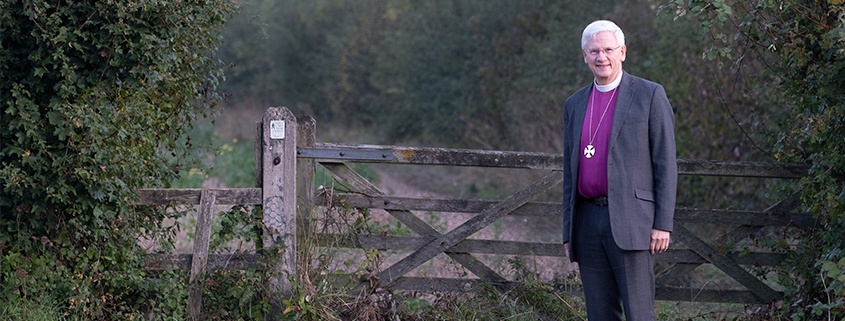“Come away to a deserted place all by yourselves and rest a while”Mark 6.31
Posts
Bishop Colin gave the following sermon during a Church at Home live stream earlier this week.
Leadership and its different styles have been very much in the media over the past few weeks.
The question, ‘Who is in charge?’ when the Prime Minister fell ill.
The calm reassuring words of our Queen.
The unpredictable statements coming from across the pond.
And the energy shown by Joe Wicks encouraging us to be active.
All of these, and many more, have given us insights, some helpful and some disconcerting, of leaders under pressure. And at the same time, as we have travelled with Jesus, from Palm Sunday through this Holy Week, we too, in this quite extraordinary and disorienting year, have been accompanying a leader under the greatest pressure he ever faced in his life.
A leader who had set his face to go to Jerusalem whilst knowing full well what awaited him there.
A leader who was willing to do the unpredictable, like riding into Jerusalem on a donkey, against the received political wisdom of his day.
A leader who had to wrestle with his closest followers jockeying for position, fighting silly personal battles, even betraying him, just when he needed them most.
A leader who encouraged them to look to a more hopeful future, but who experienced the frustration of their incomprehension.
A leader who, this evening, stripped off his outer garments and washed his disciples’ feet.
And some or all of those things, we too may have been thinking about, or experiencing, in the past weeks.
From my perspective, I have been immensely impressed by the ways in which people have stepped up in partnership to help others in their communities. What is going on in Oxfordshire and across the Thames Valley is a source to me both of pride and hope. My only warning to us all is one that Bishop Steven has already repeated many times. We are in this for the long haul and it is crucial that we take our breaks and do not aim to be running non-stop. Many of the major calls on our ministries, lay and ordained, will be coming in the next few weeks as the pressures from funerals, both those that are COVID related, and those that are not, along with their related pastoral care, mount up.
Of course, with these will come the opportunities to do some of the things we are best at doing. There will be the Memorial and Thanksgiving Services that we will be asked to take. The re-opening of our churches and the opportunity to ring our bells again can be celebrated at various points. And All Souls’ Tide could be marked as never before.
But all of that lies ahead.
For the moment what sort of leaders will we be called on to be? Two things have struck me as I have reflected in preparation for this sermon both on the scriptural passages and on the Ordinal.
The first is the call for gentleness. There is plenty of evidence that in the experience of a major trauma individuals and communities can switch quite quickly from heroic endeavour into back-biting and blame. Indeed, it is arguable that you need then to work through the inevitability of the latter in order to emerge the stronger as a result. If that is indeed the case then I, and my fellow bishops need to heed the words that our authority is given ‘ to heal, not to hurt, to build up, not to destroy’ or in the pattern of Christ and in his words, quoting Isaiah, to us all, ‘A bruised reed he will not break, and a smouldering wick he will not snuff out, till he leads justice to victory’. Much of this will be happening after I have retired but the big thing will be to give this the time it will need, individually, in our Ministry Teams, in our Congregations and in our wider communities.
If gentleness is crucial, then so will be an appreciation of the ordinary. The longer I have served as a bishop, the more I have come to appreciate the importance of the ordinary in our life of our diocese. What comes naturally and the relationships we form really matter. Recently I was reminded of that in a passage that Charles Chadwick drew to my attention. It comes from Michael Ramsey’s classic book ‘The Christian Priest Today’ though the lessons he draws from scripture apply to the laity as well as the clergy. I quoted it recently at Diocesan Synod and it is well worth repeating.
And with this I close.
‘Amidst the vast scenes of the world’s problems and tragedies you may feel that your own ministry seems so small, so insignificant, so concerned with the trivial. What a tiny difference it can make to the world that you should run a youth club, or preach to a few people in a church, or visit families with seemingly small result. But consider; the glory of Christianity is its claim that small things really matter and that the small company, the very few, the one man, the one woman, the one child are of infinite worth to God. Let that be your inspiration. Consider our Lord himself.
In a country where there were movements and causes which excited the allegiance of many – the Pharisees, the Zealots, the Essenes, and others – our Lord gives many hours to one woman of Samaria, one Nicodemus, one Martha, one Mary, one Lazarus, one Simon Peter, for the infinite worth of the one is the key to the Christian understanding of the many.
It is to a ministry like that of our Lord himself that you are called. The Gospel you preach affects the salvation of the world, and you may help your people to influence the world’s problems. But you will never be nearer to Christ than in caring for the one man, the one woman, the one child. His authority will be given to you as you do this, and his joy will be yours as well.’
+Colin
Maundy Thursday 2020
Details of our Church at Home services can be found on the website
 We begin a new course in the Diocese of Sheffield tomorrow called Leading Well. It’s a new three year rolling programme for incumbents across the Diocese. The first cohort of around twenty are mainly in their first three years of their first incumbency. We also invited everyone who has moved into a new post in the last year.
We begin a new course in the Diocese of Sheffield tomorrow called Leading Well. It’s a new three year rolling programme for incumbents across the Diocese. The first cohort of around twenty are mainly in their first three years of their first incumbency. We also invited everyone who has moved into a new post in the last year.
What will happen?
There are number of different elements to Leading Well.
- A 36 hour residential for each cohort as they begin
- Six study days through the year
- An annual three day retreat for the whole group
- Mentoring support for everyone and
- Small group learning and support (mainly through the study days)
We hope to start a new cohort each January for 15-20 people. We will give priority to those beginning their first incumbency or beginning new incumbent roles (and the course will be a condition of appointment under common tenure). We have over 100 people in incumbent level roles across the Diocese so over five years, most people will have the chance to be part of the programme.
Over the three years we will explore pastoral leadership in each of its dimensions: watching over yourself (spirituality, care of self, resilience and pacing yourself); working with individuals and teams; growing the life of the church and outward facing leadership in the community.
The course will be well grounded in Scripture and the Tradition and in a deeply Christian view of pastoral leadership. We will also draw on the best of the human sciences and the wisdom of other traditions. We start tomorrow with a session on how to begin well in a new parish and a bible study on Reheboam’s choices in 1 Kings 12.
Our aim is to build, year by year, a stronger, better equipped and better supported community of incumbents across the Diocese who are able themselves to lead sustainable, growing, Christ like communities. That’s vital for the well being of the churches in this diocese and for the communities they serve.
 Why this course at this time?
Why this course at this time?
Many dioceses have leadership programmes for their clergy (about half the last time I counted). We’ve been exploring something like this in Sheffield for some years but haven’t yet found the right model.
In my observation, the role of an incumbent is becoming more not less demanding for a whole variety of reasons. The learning is steepest when a person moves from being a curate to a vicar or else moves from one parish to another. That’s the time for maximum support. Recent research demonstrates very clearly that courses in leadership make a significant difference to clergy and to their parishes.
Who will be leading?
We hope that everyone who comes to Leading Well will want to be collaborative, adaptable and mission minded. The course is led by a team of three: Helen Bent, Mark Cockayne and myself. All three of us have had significant experience of leading this kind of programme in different places. We will be drawing in guest speakers from inside and outside the Diocese for the one day courses.
For my own part, I’m really looking forward to becoming a hands on theological educator again and working with a small group of incumbents in depth. That’s not because I know all the answers. I will probably learn as much if not more as anyone else on the course. It’s because, I believe, Leading Well has the potential to help everyone who comes find new resources for their leadership and become the very best pastoral leader they can be.


 Steven Buckley
Steven Buckley
